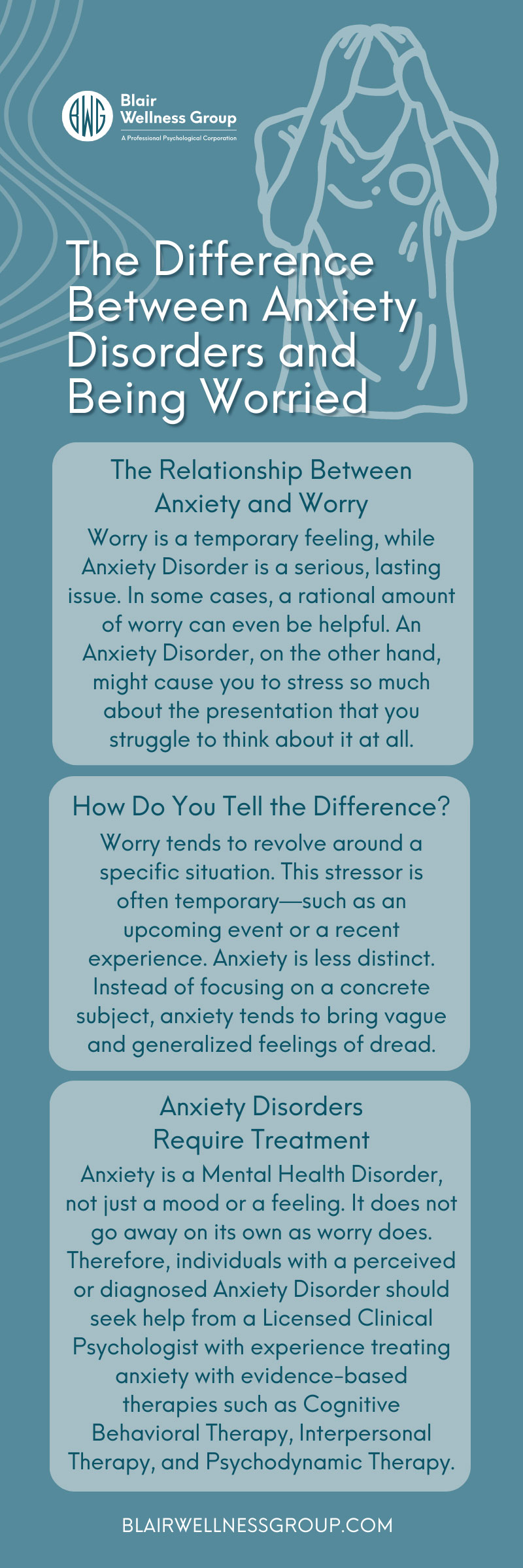One of the hardest parts of having a Mental Health Disorder is figuring out which thoughts and feelings are a normal part of life and which are serious symptoms of your disorder. With Anxiety Disorders, it can be difficult to separate normal worry from the stress that stems from your anxiety.
Worry and anxiety have a fair amount of overlap. However, there are a few key differences that can help you tell them apart so that you can navigate your Mental Health Disorder. Explore the differences between Anxiety Disorders and being worried in this brief overview.
The Relationship Between Anxiety and Worry
On the surface, anxiety and worry can look and feel very similar. They both involve uncertainty, uneasiness, and concern about a situation. They can also have similar sources, including life circumstances such as money or relationship problems, stressful experiences or events, pressure and expectations, and other life stressors.
However, worry is a temporary feeling, while Anxiety Disorder is a serious, lasting issue. In some cases, a rational amount of worry can even be helpful. For example, worrying about an upcoming presentation can increase your focus and motivate you to prepare more thoroughly, increasing your chances of success. An Anxiety Disorder, on the other hand, might cause you to stress so much about the presentation that you struggle to think about it at all.
How Do You Tell the Difference?
It is important to note that worry can act as a symptom of an Anxiety Disorder. Worry, frustration, and other negative feelings make up the emotional component of anxiety. How, then, do you tell the difference between Anxiety Disorders and feelings of worry? The biggest indicator is how those feelings of concern, dread, or stress impact other aspects of your life.
Worry is a normal response, while Anxiety Disorders can be severe, all-encompassing conditions. If you are wondering whether your feelings of worry are symptoms of an Anxiety Disorder, explore the following few traits to determine what is affecting you.
Anxiety Is Physical
Worry is a mental and emotional state. It affects your thoughts and feelings, but it does not have a physical impact the way that Anxiety Disorders do. Anxiety, on the other hand, resides in the body and the mind. It involves physical symptoms in addition to mental and emotional ones. Some common physical symptoms of an Anxiety Disorder can include:
- Racing heart or irregular heartbeat
- Shortness of breath
- A tight feeling in your chest
- Dizziness or light-headedness
- Numbness or tingling in the extremities
- Sweating or hot flashes
- Dry mouth
- Nausea or churning in your stomach
- Headaches
- Tension in the body causing aches and pains, such as back pain
- Panic attacks that are sudden and last for several minutes
Anxiety—especially long-term Anxiety Disorders—can also cause other physical medical issues. Examples include chronic pain, irritable bowel syndrome, insomnia, sweating, and more.
Anxiety Is More Vague
Worry tends to revolve around a specific situation. This stressor is often temporary—such as an upcoming event or a recent experience. Anxiety is less distinct. Instead of focusing on a concrete subject, anxiety tends to bring vague and generalized feelings of dread.
Of course, anxiety can still revolve around a specific subject or circumstance in life. For example, some people developed Anxiety Disorders as a result of the coronavirus pandemic. However, anxiety is still a broader, more encompassing feeling in these situations. Someone worried about COVID-19 might continue to wear a mask so that they do not get sick. Someone with an Anxiety Disorder might struggle to identify a clear or single source of their fear. In addition to feeling concerned about their health, they might worry about losing touch with friends, leaving their house, dealing with pandemic-related changes at work, and other concerns that they might not be able to name.
Anxiety Is Irrational
Anxiety Disorders, like many Mental Health Conditions, involve maladaptive thought patterns that can create irrational thoughts, phobias, or fears. These maladaptive thought patterns lead to catastrophic thinking, which is a common symptom and a clear indicator of anxiety. People with Anxiety Disorders overestimate the danger of a situation. Their body’s reaction to the perceived danger is what leads to anxiety symptoms like spiraling thoughts and shortness of breath.
Worry, on the other hand, is a grounded, rational reaction to a tangible source of stress. For example, it is normal to feel nervous about meeting new people. Worry might cause you to wonder if you made a good impression when you introduced yourself. With anxiety, however, you experience spiraling, catastrophic thought patterns that cause you to exaggerate the negative outcome of the situation. Instead of wondering whether you made a good impression, you might fear that you ruined the entire encounter and did irreparable damage to your relationships.
Worry Is Temporary
As mentioned above, worry often involves temporary stressors. It might be stressful in the moment, but the concern eventually passes. With an Anxiety Disorder, feelings of fear and dread are more persistent—even when there is no present stressor. As a result, it is also difficult to address anxiety through rationality, problem-solving, and other skills that might help you work through worry.
Anxiety Impairs Function
All of these characteristics—physical symptoms, difficulty identifying a source, and irrational, persistent fears—contribute to the fact that Anxiety Disorders can cause a serious disruption in your life. Anxiety creates stress that can consume your entire day, put a strain on relationships, and create other serious effects on your life. Furthermore, dealing with an Anxiety Disorder can affect your confidence in your ability to handle stress and conflict. The deep impact anxiety has on your physical, mental, and emotional well-being can prove detrimental to all aspects of life.
Anxiety Disorders Require Treatment
Unlike feelings of worry, Anxiety Disorders require treatment from a mental health professional. Anxiety is a Mental Health Disorder, not just a mood or a feeling. It does not go away on its own as worry does. Therefore, individuals with a perceived or diagnosed Anxiety Disorder should seek help from a Licensed Clinical Psychologist with experience treating anxiety with evidence-based therapies such as Cognitive Behavioral Therapy, Interpersonal Therapy, and Psychodynamic Therapy.
Find Help at Blair Wellness Group
Do not let your Anxiety Disorder continue to rule your life. Blair Wellness Group offers expert, concierge-style anxiety therapy in Irvine and the surrounding areas. Visit us today to learn more about our services and start your journey to better mental health.















